1914 - THE EARLY DAYS OF WAR
FROM THE MINUTES OF THE NURSING BOARD OF QUEEN ALEXANDRA'S IMPERIAL MILITARY NURSING SERVICE
*****


From the very first days of Queen Alexandra's Imperial Nursing Service in 1902, an advisory Nursing Board met each month to deal with the organisational and administrative matters which were the foundations of the Service. The Nursing Board was composed of senior members of the army medical and nursing services, together with civil hospital Matrons and other persons with a wide knowledge of hospital administration and Government. The composition of the Board changed over the years, sometimes due to ill-health or other pressing committments, sometimes because of disagreements over policy. Although meetings of the Board intially carried on following the outbreak of war, they were suspended for a period of two and a half years between January 1915 and September 1917 and it's unclear how decisions were taken during that time.
The Board resumed regular meetings in the autumn of 1917 and minutes of the meetings survive for the remainder of the war and beyond. Below are two items taken from the minutes, later published in bound volumes, a few of which survive both at the Army Medical Services Museum and in a collection privately held. One outlines recruitment during the early months of war, and the other is a summary of the nursing services in France and Flanders and the movements of the hospitals during the first five months of war, written by the Matron-in-Chief Maud McCarthy.
*****
REPORT ON SPECIAL WORK OF THE SELECTING SUB-COMMITTEE, QUEEN ALEXANDRA'S IMPERIAL MILITARY NURSING SERVICE
*****
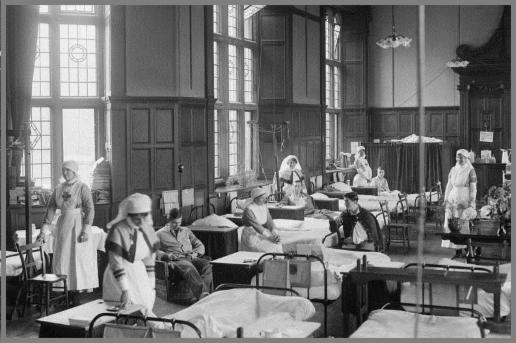
No.3 Southern General Hospital (T.F.) Oxford (IWM Q30280)
*****

No.3 Southern General Hospital (T.F.) Oxford (IWM Q30280)
Since the commencement of the war the Selecting Sub-Committee has met 17 times. At these meetings 1,351 applications from nurses have been considered. All nurses resident in or near London have been interviewed at the meetings.
Accepted 570The remainder have withdrawn or accepted work under different organisations before their applications could be approved. In the early days candidates were rejected because they had not received the required standard of training, i.e. in hospitals containing over 100 beds. In view, however, of the enormous demand for nurses still to be met it has been thought advisable to lower this standard and to accept nurses trained in hospitals of 60 beds and upwards provided they are otherwise eligible, and the candidates rejected, for this reason only, will be communicated with to re-submit their applications, should this meet with the approval of the Nursing Board. Of these nurses selected since the commencement of the war 382 are employed in military hospitals; 142 waiting to be called up. The remainder have withdrawn since being accepted, i.e. 46. On an average, 40 applications are still considered weekly.
Rejected 707
Since 1st January, 1915 -Nurses have been supplied to 25 Military Hospitals in which, before the war, no Q.A.I.M.N.S. were employed. The health of the Nursing Staff until lately has been excellent. During the last month there have been many on the sick list with influenza. One nurse, Miss Fearnley, of St. Thomas’s Hospital, died in Boulogne from causes entirely unconnected with either the work or conditions of service. Two cases of mental derangement have occurred – one on the eve of departure for abroad, a member of the T.F.N.S., the other a nurse of the Civil Hospital Reserve from the West London Hospital. The former has completely recovered, the latter had been five months on active service and is still in the institution to which she was removed. The remainder of the nurses invalided from France, with the exception of three requiring operations, have been mainly convalescents, and have, after a few days in the Sisters’ Ward at the Queen Alexandra Hospital, been granted sick leave.
85 nurses have been sent to France.
80 nurses have been supplied to Home Stations.
The total number admitted since August is thirty-four, twenty-two of these being from the Expeditionary Force. The conduct of the nurses who have been appointed from so many and varied sources has been very satisfactory, all being employed under Matrons or Acting Matrons it has been easy to discover any who were not entirely suitable for military duty. In these cases resignation was advised and forwarded.
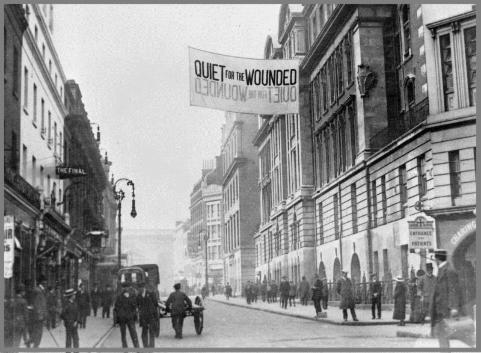
Charing Cross Hospital, London, 1914 (IWM Q53311)
E. H. Becher, Matron-in-Chief, Q.A.I.M.N.S.
January, 1915.
*****
SHORT SUMMARY OF PRINCIPAL EVENTS CONNECTED WITH THE NURSING ARRANGEMENTS OF THE BRITISH EXPEDITIONARY FORCE IN FRANCE, FROM 12TH AUGUST, TO 31ST DECEMBER, 1914
*****
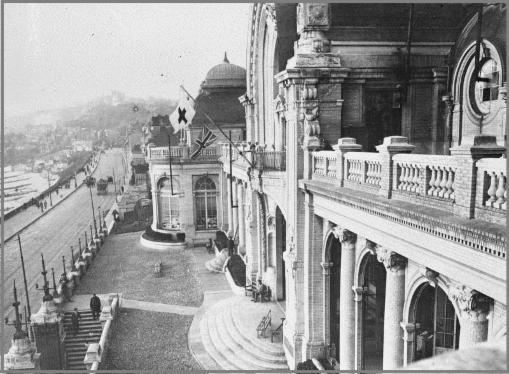
The Casino, Le Havre, home to No.2 General Hospital (IWM Q10560)
*****

The Casino, Le Havre, home to No.2 General Hospital (IWM Q10560)
12th August. – I left Aldershot with No.2 General Hospital, as Principal Matron of the Expeditionary Force, with orders to report myself to the Deputy Director of Medical Services, Lines of Communication, on arrival.
15th August. – I arrived at Havre and reported myself at the Deputy Director of Medical Services’ offices; the Deputy Director of Medical Services had already left for an Advanced Base.
No.2 General Hospital, with Colonel Holt in charge and Miss Richards as Matron, was opened with as little delay as possible, partly under canvas and part in three good buildings: The Casino, the Palais de Regatta (set aside for officers only), and the Gare Maritime, where the trains arrived and where the ships were alongside of the quay; overhead the waiting rooms and railway restaurant were soon converted into a hospital to accommodate 300 patients and the nursing staff required for this admirable Clearing Hospital; also an operating theatre, a small officers’ ward, and good kitchen accommodation were provided in one of these buildings. Her also the Matron made her headquarters.
In the course of the next few days Nos. 1, 4, 6, 8, 9, 10, 11 and 12 General Hospitals arrived, which were met and accommodation arranged for each. There was some difficulty in arranging this, owing to the large number of officers and men arriving in very large numbers at the same time.
During the week No.1 General Hospital received orders to open at Havre; No.8 had to divide – half to go to No.1 General Hospital and the other half to No.2. Nos. 6, 9 and 10 proceeded under secret orders – their destination was supposed to be Amiens.
I received great assistance from the Paymaster who gave me authority to hire a motor car as the Transport were unable to supply one. As many of us had come with very little ready money I was given an imprest, so that I was able to pay all hotel bills; for the first month or two this overcame existing difficulties until the Last Pay Certificates had been received for the regular staff and authority issued to pay the large number of reserves.
25th August. – I received orders to proceed to Rouen, where I found No.5 General Hospital established under canvas at the race-course; No.3 General Hospital was in a large college, with a certain number of marquees pitched in the grounds; and another college was being made ready as an officers’ hospitals; the engineers were busy constructing scullery, bath and lavatory accommodation. The kitchens invariably were excellent, but in all these buildings lavatory and bath accommodation appeared very bad indeed, and the want of proper fresh water supply was another ever-present difficulty. I met Sir Alfred Keogh on his way to Headquarters, and he rendered me the very great assistance, by purchasing and supplying us, from the Red Cross, with whatever the hospitals were in urgent need of for the comfort of the patients.
Nos. 4, 6, 9, 11 and 12 General Hospitals were awaiting orders, and their nursing staffs were accommodated in convents and schools. As soon as I learnt that wounded were arriving from the front, many of whom went straight on to Havre, from the staff who were unemployed at these hospitals I detailed the nursing sisters for day duty and night duty at No.1 Clearing Hospital at the railway station.
27th August. – Surgeon-General Woodhouse arrived from Amiens, and he spoke in the highest terms of the whole staff of No.7 General Hospital, who did not leave their hospital until all the patients had been moved; then half of the staff arrived in the evening with many of the patients, and the other half passed through next morning with the Matron and the remainder of the wounded, leaving the hospital at Amiens vacated as ordered.
30th August. – At midnight orders came that everyone should be out of Rouen in 48 hours. By the next morning all wounded officers and men, except those unable to be moved, were sent by train to Havre, and the few serious cases – some half-a-dozen – who were unfit to travel, had to be taken to French hospitals. All these arrangements were made with extraordinary rapidity and order. It was arranged that the nursing staff of our hospitals at Rouen should proceed by train with me to a suitable base (St. Nazaire), where they were to remain until the military situation was such that they could be telegraphed for, as required, to rejoin their respective hospitals as they re-opened.
At Le Mans, on our way to St. Nazaire, I was met by Lieut.-Colonel Barefoot, who came from the Director of Medical Services to say that some nurses were required there, as many of our troops were being nursed in the French hospital. I accordingly left the train with 20 nursing sisters, leaving Miss Smith, the senior Matron, in charge of the party proceeding elsewhere. No.5 Stationary Hospital, opened at an archbishop’s palace, was where the nursing staff were required; and this staff, with Miss Bills in charge, began the first thing next morning to get everything in readiness with as little delay as possible for the reception of the sick. In this building there was neither lavatory nor bath accommodation, nor was there either gas or electric light. Consequently the engineers began work at once, and in a very short time there were prepared sufficient conveniences to carry on with; by the end of the week gas had been installed. Without any longer delay than was necessary, and as the military situation improved, the nursing staff was increased.
During the month of September, Nos. 1, 2, 8, and 10 General Hospitals also arrived at St. Nazaire from Havre. I received permission to bring Miss Barbier from St. Nazaire as my secretary.
Nurses were supplied for day duty and night duty at No.3 Clearing Hospital at the railway station. Also nurses were sent by twos in charge of wounded proceeding from Le Mans to the base, and later an experiment was tried of putting nurses first on one ambulance train and then on another going to the base, and eventually they were permitted to proceed to the front. This arrangement proved so successful that now all ambulance trains have a similar nursing staff attached, with the result that I continue to receive satisfactory reports of their work.
No.9 General Hospital, under canvas, was opened at Nantes. The nursing staff of No.7 arrived at Le Mans, and from it the staffs of Nos. 1 and 5 Stationary Hospitals were found, Miss Read, the Matron, being placed in charge of both. I made use of these units as we had no hospital equipment in the retreat from Amiens to Rouen. Both these hospitals were opened in buildings.
No.5 General Hospital was opened at Angers. A clearing hospital at Angers railway station was opened, with two nursing sisters for both day and night duty.
No.4 General Hospital was opened at Versailles in a most luxurious hotel – Hotel Trianon Palace – situated in beautiful grounds.
No.8 General Hospital was opened at Rouen, in the same building which No.3 had recently vacated.
No.12 General Hospital was opened on the race-course, on the same site where No.5 was first opened.
21st September. – Headquarters, Inspector-General of Communications, moved to Villeneuve, where a station was already established. Nursing sisters were required, which I obtained from No.6 General Hospital staff. Most of the equipment of this hospital had been lost in the hurried retreat from Rouen by water to St. Nazaire. Also from No.6 General Hospital I obtained the necessary staff for the various ambulance trains as they came into being. The American Ambulance applied for 10 nursing sisters to help them out of a difficulty. As we still had some of the staff unemployed, the 10 nursing sisters asked for were lent for 10 days, with Miss A. L. Walker in charge.
Nos. 3, 10 and 11 General Hospitals were opened at St. Nazaire. Two nursing sisters – Miss Corbishley, Q.A.I.M.N.S., and Miss Hokes, C.H.R., were sent to Orleans to nurse some British patients in one of the French hospitals.
In October No.10 Stationary Hospital was opened in Orleans, with Miss Tunley in charge and a staff of 10. An annexe to No.4 General hospital was opened, under canvas, in a meadow adjoining, for the reception of enteric patients, with Miss A. L. Walker in charge.
At Rouen No.10 General Hospital was opened, with Miss Mansan in charge, the remainder of the staff being made up from No.7 General Hospital, under canvas. During this month I had to, for the first time, apply for extra nurses in consequence of the constant demand for them in unexpected places.
Nos. 1 and 2 General Hospitals returned to Havre, where they again opened – No.1 under canvas, and at the Palais de Regatta; No.2 was opened in buildings only; the Gare Maritime, the Casino, and a new building which was well furnished and makes a most comfortable officers’ and nursing sisters’ hospital. Here at Havre the nursing staff are well accommodated and all arrangements, both for the nursing of the patients and the comfort of the nurses, are most excellent.
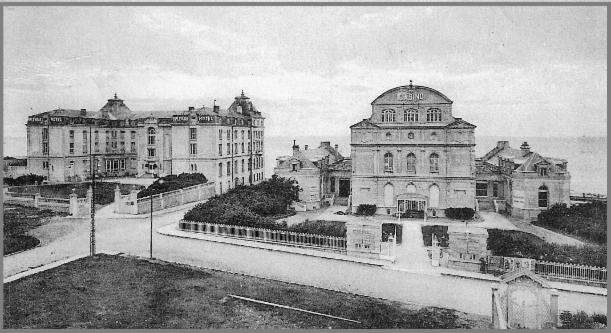
14 General Hospital, Wimereux, The Casino and Hotel Splendid
16th October. – Headquarters moved to Abbeville.
No.11 General Hospital was ordered to Boulogne.
No.13 General Hospital arrived from England.
No.14 General Hospital arrived from England.
No.7 Stationary Hospital was opened in a large hotel, and, as No.5 General Hospital had packed up, the staff proceeded from Angers to take over this important hospital which was capable of accommodating 400.
No.14 Stationary Hospital was staffed from as many of No.6 General Hospital staff as were then available, with Miss Dods in charge. This arrangement was made in consequence of No.6 General Hospital still being unable to open anywhere, nor did there seem to be any prospect of it being able to do so.
During the month, from the time that Boulogne was occupied, acting under instructions, some Red Cross nurses were employed temporarily in No.7 and No.13 Stationary Hospitals and Nos.11 and 13 General Hospitals. Only those fully trained were employed. A certain number who were untrained were taken on without my knowledge, for one day only and then their services were at once dispensed with. This I reported immediately to the Matron-in-Chief. From then to the present time I have been supplied with reinforcements from the Matron-in-Chief as fresh units are established and nurses required.
In November. – No.10 Stationary Hospital was moved from Orleans to general headquarters and the staff increased.
A staff of five nursing sisters was asked for for all Clearing Hospitals.
At the present moment the situation is:
Havre
No.2 General Hospital, established in four different buildings – Miss Richards, Matron.
No.6 Stationary Hospital, in one large building – Miss Mackay, Matron.
Etretat
No.1 General Hospital, in a hotel – Miss Hodgins, Matron.
Rouen
No.5 General Hospital, under canvas – Miss Hordley, Matron.
No.6 General Hospital, under canvas – Miss Reid, Matron.
No.8 General Hospital, partly in a building and partly under canvas – Miss Suart, Matron.
No.9 General Hospital, under canvas – Miss Osborne, Matron
No.10 General Hospital, under canvas – Miss Mark, Matron.
No.12 General Hospital, under canvas – Miss Cheetham, Matron.
No.11 Stationary Hospital, under canvas – Miss Minns, Matron.
Red Cross Officers’ Hospital, in a college – Miss Bills, Matron.
No.3 Stationary Hospital, about to open in a large building – Miss M. S. Smith.
Boulogne and Wimeraux [sic]
No.11 General Hospital, established in a hotel – Miss Blakeley, Matron.
No.13 General Hospital, established in the Casino – Miss Wilson, R.R.C., Matron
[this refers to the Casino at Boulogne]
No.14 General Hospital, established in the Casino and an hotel – Miss Clements, Matron.
[this refers to the Casino at Wimereux]
No.2 Stationary Hospital, established in a hotel – Miss Denne, Matron.
No.7 Stationary Hospital, established in a hotel – Miss A. B. Smith, R.R.C., Matron.
No.13 Stationary Hospital, established in sugar sheds – Miss A. L. Walker, Matron.
No.14 Stationary Hospital, established in a hotel (Isolation Hospital) – Miss Dods, Matron.
Rawal Pindi Hospital, in two hotels – Miss Watts, Matron, Lady Superintendent Q.A.I.M.N.S. [This should refer to Q.A.M.N.S. (India)].
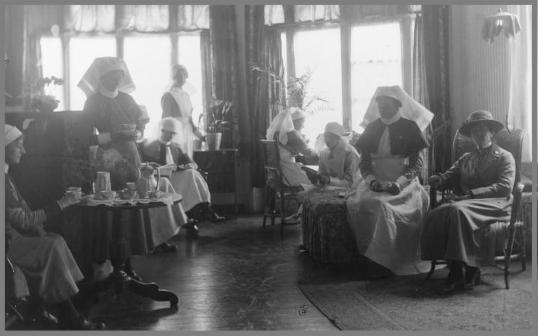
Nurses' sitting-room, No.14 Stationary Hospital, Wimereux (IWM Q8012)
Versailles
No.4 General Hospital, in a hotel – Miss Beyers, Matron [probably refers to Miss Annie Buyers].
Le Treport
No.3 General Hospital, in a hotel – Miss Steen, Matron.
Dieppe
No.5 Stationary Hospital – Miss Drage, Matron.
Abbeville
Section B, No.5 Stationary Hospital, General Headquarters – Miss Fox, Matron
No.10 Stationary Hospital, in a school – Miss Tunley, Matron.
Nine Clearing Stations.
Twelve Ambulance Trains.
Seven Hospital Ships.
With regard to the nursing staff, wherever it is possible, the Matron and the nursing staff are accommodated together. A mess if formed and rations are drawn, which is found to be in every respect the most satisfactory arrangement; but in the hospitals where this is not possible suitable accommodation is procured in various hotels, where special arrangements are made for the convenience of the staff, and also where liberal meals can be provided for those going on night duty, which they take with them as in England.
The payment of nurses, which was at first a difficulty, has now been satisfactorily arranged, and in consequence of all being able to draw field allowance no one should be out of pocket. If similar lodging allowance to that which is now granted to all officers were also granted to the nursing staff as well, under Clause 13, they would be liberally provided for.
On all sides I continue to receive satisfactory reports of the work and behaviour of the nursing staff, and those few difficulties which have arisen are now, so far, satisfactorily settled here. I have always received the very greatest consideration and help from everyone with whom I have come into contact, and without which it would have been impossible for me to have managed.
E. M. McCarthy, R.R.C., Acting Matron-in-Chief, British Expeditionary Force
January, 1915.